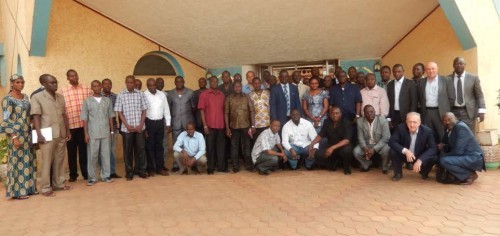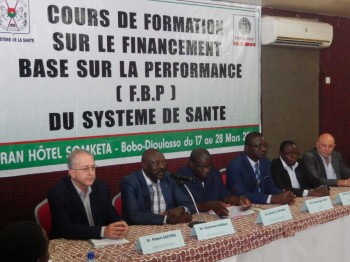The Burkina Faso Ministry of Health with support from PADS and the World Bank organised a 14-day PBF course in Bobo.
The course finished the 28th of March.
There were 44 participants, most of them civil servants from the district, regional and national levels and 5 participants from civil society.
Burkina Faso pilots since 2011 a PBF programme in three districts (Leo, Boulsa and Titao), which had such encouraging results that the Ministry of Health scaled up PBF by the beginning of 2014 to cover 15 districts and 25% of the country population.
For January 2014 the first USD 200.000 was being paid in the bank accounts of hundreds of health facilities. An enormous training effort has been conducted that reached two thousand health workers and a PBF manual is continuously being improved. We congratulate the Ministry of Health with their dedication towards PBF.
The course participants worked on specific themes on how to improve the PBF experience in Burkina. Their work shows that there are still important risks related to the PBF program in Burkina and notably: (a) The Contract Development & Verification Agencies are not yet in place. Burkina choses to contract national or regional CDVs for reasons of cost control and sustainability. This mishap delays the implementation of the community verification and other aspects of the program; (b) An integrated costing of the PBF program must still be done to guide the financial planning and identify (if any) the financial gaps; (c) The selection of the most vulnerable patients has not yet started because there is a debate in how far this should be done by an external organisation or through the health workers of the health facilities; (d) There is still a central medical stores monopoly in Burkina for essential drugs causing multiple stock-outs in health facilities and government should at least allow health facilities to buy drugs in other distribution centres in case of better price – quality ratio. (e) There is still an incomplete autonomy of the health facilities whereby management is subjected to cumbersome financial procedures. The setting of user fee prices is also still centralised.
Yet, we are convinced that these problems will progressively being solved and by training 44 Burkina participants in “pure” PBF the critical mass and advocacy capacity will have increased considerably. In fact, we believe that Burkina Faso for PBF is a key country that will show the road towards a realistic approach to enhance universal health coverage.



